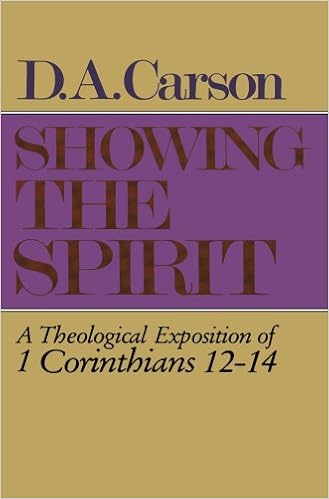Brown, Michael L. Authentic Fire: A Response to John Macarthur’s Strange Fire.
The Strange Fire conference was fiery but not in a way people on both sides realize. It had a high flash point and no substance.
Michael Brown first addresses the common criticism of him: why does he not he rebuke x, y, and z? (Phil Johnson makes this criticism). For one, Brown has written several books condemning these wacky charismatic abuses. Secondly, most charismatics don’t “bark in the Spirit,” so why call unnecessary attention to it?
As to the extreme emotionalism, is that always the case? Brown quotes John Wimber where Wimber encourages people to “dial it down” (Wimber, Power Healing). J. P. Moreland, a charismatic, wrote a book called Finding Quiet where he lists a number of calming practices.
One of Macarthur’s criticisms is that any good the charismatics have produced has been in spite of themselves, not because of it. Not only is this is wrong, this is just bitter-spirited. Let’s look at it:
Ben Witherington: leading New Testament scholar. Can he separate his faith from his theology? Indeed, he mentions going to a healing and exorcism service.
Craig Keener: written the leading (and largest) commentary on Acts. Acts is about miracles. Keener gives testimony in his own life of experiencing miracles. Can he really separate his faith from his scholarship.
J. P. Moreland is an outspoken charismatic and leading philosopher. He wrote a book specifically integrating a charismatic view on prophecy and healing with his epistemology.
Other criticisms include asking where the charismatic hospitals are, to which Brown documents numerous ministries that feed and care for thousands of starving people in the Global South.
Chapter 4 details all of Macarthur’s guilt-by-association fallacies. This chapter should be in all rhetoric textbooks as an example of counter-arguments. If x is guilty of a position because he had some degree of previous association with y, then that same argument can be used against you. Look at it this way. Macarthur is a dispensationalist. John Gerstner said dispensationalism was borderline heresy and a deviation from orthodoxy, yet Macarthur had RC Sproul, Gerstner’s student, speak at Strange Fire. Is not Macarthur endorsing Gerstner’s attacks on dispensationalism?
Let’s look at it another way. Michael Brown said Cindy Jacobs was a friend. Not endorsing her theology, just a friend. Well, Brown has also spoken at Southern Evangelical Seminary of the late Norm Geisler. Was Geisler then promoting Jacobs’ theology? See how silly this is?
Chapters 5ff deal with some of the more problematic (and alleged) Pentecostal practices. This is in the context of Macarthur’s rhetorical question, “Does it oppose worldliness” (Implied answer no). Don’t Pentecostals in the Global South hold to a prosperity gospel? Not exactly. Let’s take the question: “Does God want his people to have material prosperity?” In the jungle of Africa that means “Not starve to death tomorrow.” And in some sense we can say, “Correct, God doesn’t want you to starve to death.” These people aren’t thinking of buying a BMW. They want a bicycle to be able to preach the Gospel in another village.
In other places like Brazil where Pentecostals did give more carnal answers, their answers really weren’t different from the non-charismatics.
Brown asks a rather pointed question: how is it right for members and preachers in a lavish megachurch, some having flown there on planes, in air-conditioning, no doubt well-fed, condemning starving believers in other parts of the world simply because the latter said God wants to meet their needs?
And as to theological worldliness–how is American Protestantism doing these days? Many of the major conservative denominations are in an existential fight against Marxism and liberalism. It’s not Pentecostalism that is lurching to the left.
Brown’s Positive Case
1. The NT states these gifts will continue until Christ returns (1 Cor. 1:7-8; 13:8ff).
2. The NT encourages use of these gifts.
3. The NT never states these gifts will cease.
Were Jesus’s miracles confirmation miracles? Some were but not all. Many healings happened because he had compassion, not because he had to prove he was God. Others proved the messianic age had begun (and the NT makes a correlation between the outpouring of the Spirit and the beginning of the Messianic age).
Raymond Brown goes so far to say that the miracle wasn’t the external confirmation of the message; rather, it was the vehicle of the message.
In any case, miracle isn’t even the word the NT uses. It is dunamis or “working of powers.” Galatians 3:5 says the Spirit works powers among us. Therefore, if the same Spirit comes upon believers today, why shouldn’t we expect the working of powers?
Conclusion
I believe we should write more books explaining and integrating miracles and charismata in the church today. We need to focus on positive cases. This book should serve as the final nail in the cessationist coffin. Even cessationists are backing away from their earlier claims.


